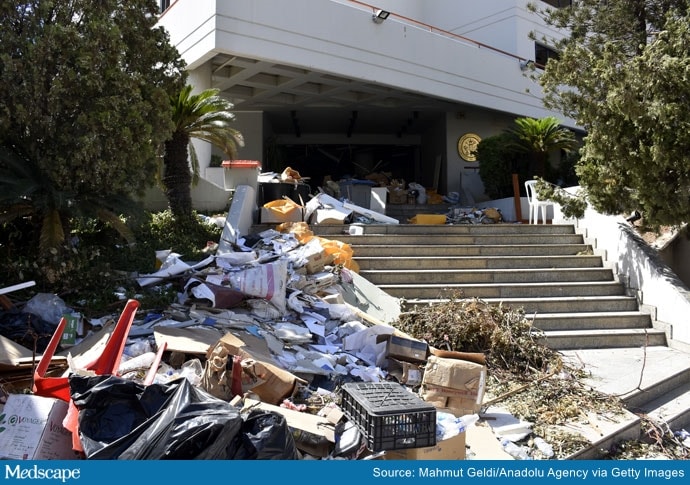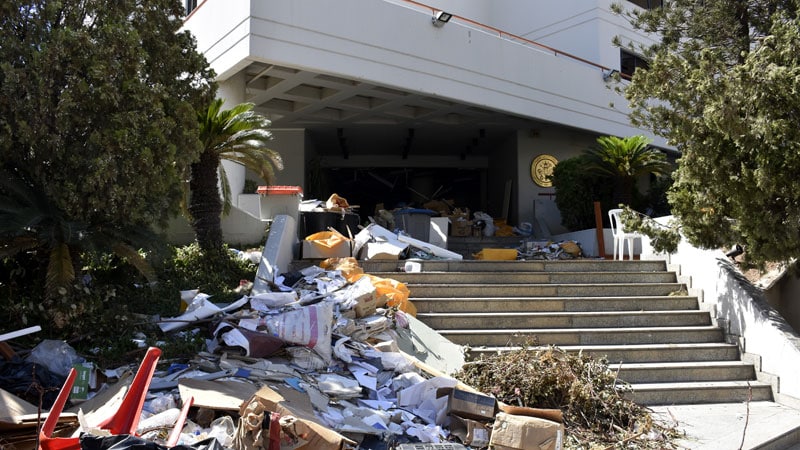George Azar, MD, is a cardiology resident at Saint George Hospital in Beirut, Lebanon. Saint George is less than a mile from the Beirut port where a warehouse filled with ammonium nitrate exploded on August 4th, killing over 200 people and injuring thousands more. These are Azar’s recollections of that day.
August 4th was just a regular day. Around 6 p.m., I was called to check on a patient for a cardiac consultation. The patient’s room that I was in had a big window — the view was straight to the Beirut port. After examining him and answering questions, I saw black smoke coming from the Beirut port. I thought it was a fire or some machinery, like an engine releasing smoke and fumes. I offered to close the patient’s window so the smoke wouldn’t cause any discomfort.

Seconds before the explosion, I closed the window and excused myself from the patient’s room. As soon as I was two or three steps out, it happened. We heard the boom, a very loud boom. The building was shaking. There was the big blast, the sound waves that broke the windows. I remember a force throwing me forward. One of the patient-room doors was unhinged and pushed me to the floor.
We were all disoriented, like we did not believe this was happening. The fire alarm was ringing, a very high-pitched sound, but it took me a few seconds to realize that — and to process everything around me. There was dust everywhere. I realized, okay, I am in a familiar place that is not familiar anymore. A few seconds after that, the screaming and the shouting began. People couldn’t get out of the rooms. They were heavily injured by the glass.
When I stood up and looked around me, I don’t know how to formulate it, but thank God I did not panic. All the adrenaline is pumping through your body after such a big event. I kept my focus — I tried to be composed as much as possible. This is what we have been trained to do.
At the same time, I thought, “My family. I need to let them know that I’m alive.” They live in another area outside of Beirut. Luckily, I could find my phone on the floor next to me. I just sent them a quick message: “I’m okay, I’m alive.” My girlfriend works at the hospital in a different department so I needed to make sure that she’s alive, that she’s okay.
One of the nurses was in very bad shape. The force of the blast pushed her into a wall. She had severe internal hemorrhage. She was bleeding everywhere and we tried to save her — me and some colleagues on the floor that came to help. We tried to put a tube into her throat and help her breathe, because she wasn’t able to breathe on her own due to her brain injury and bleed. We had to do this on the floor in a damaged environment with very, very minimal resources because everything was either destroyed or thrown into another area. We had to carry her on our backs and get her to the emergency department where we thought she could get more adequate help.
When we got to the emergency department, we discovered that the ER was also severely affected by the blast. It was more of a junkyard than an emergency department. There was debris and glass everywhere. Unfortunately, we could not save the nurse’s life. She was a mother. She had a baby. So, yeah, it’s just too much to process. My patient was also severely injured from the glass flying everywhere. He didn’t make it.
Injured patients started coming in from neighboring houses. They thought the hospital was still functioning and they started converging onto the emergency department to seek help. We started assessing those who could be bandaged or lightly sutured. We just did first aid. That’s all the resources that we could provide at that time. We were referring patients to other hospitals where they could seek proper care.
That day, we lost four nurses and more than 12 patients, visitors, and family members. A lot of my colleagues have also been hurt severely. Most of them underwent surgical procedures to fix damage on different parts of their bodies.
The blast happened on a Tuesday. Thursday, 48 hours after the blast, I was awake, wearing the same blood-tinged clothes, from all the people that we saw. I didn’t even realize until that moment that I hadn’t eaten anything. I had not slept. I had not drunk even water. At that time, I realized that my body was giving me signals — like, “George, you took care of a lot of people. Now it’s time to take care of yourself.” We took some time to try and rest, recharge our energy in order to restart our work as soon as possible.
After the blast, everyone was facing two major problems. The first was the psychological trauma on top of the physical trauma. The psychiatry and psychology departments started working immediately after the blast, because they know that a stressful event of that magnitude will leave its mark.
The second big problem was the coronavirus. We were distracted from the threat due to the blast, but the virus is still here. The numbers are increasing day after day. Lots of people are without homes right now in Beirut, which makes things more challenging.
As doctors, we have an oath to do no harm — to help everyone. After the explosion, every doctor respected this oath and came to help despite their injuries, despite their wounds. From a career standpoint, it gave me a push forward to be more perseverant, to be focused and composed in crisis times.
From a personal standpoint, I think we are still waking up from the trauma. I still have nights when I cannot sleep. I keep having flashbacks of what happened. Sometimes I have nightmares. It’s not easy.
But I think we’re all trying to help each other. When there’s a hardship, a really big event, humans will go back to their good nature. They will put aside their problems and really focus on supporting each other in times of need. This restores your faith in humankind.
For more news, follow Medscape on Facebook, Twitter, Instagram, and YouTube.
